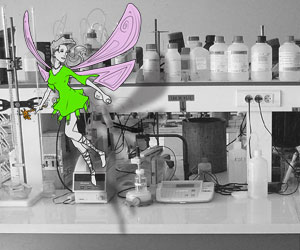Do you have any good hair grooming products to recommend?
-Annie
Being a scientist isn’t just about doing experiments, so neither are we. This is where we make breakthroughs beyond the bench for scientists.
by
by
 When asked what makes a successful scientist, researchers answered “work ethic, intelligence, and luck.” For many, the realization that a large component of their career success hinged on a factor out of their control was upsetting. We agreed and decided something had to be done to bring lady luck into the lab – specifically, to our bench.
When asked what makes a successful scientist, researchers answered “work ethic, intelligence, and luck.” For many, the realization that a large component of their career success hinged on a factor out of their control was upsetting. We agreed and decided something had to be done to bring lady luck into the lab – specifically, to our bench.
by
I’ve noticed the trend of bright color in magazines. How do I wear it without feeling like a clown?
-Laura
by
 Here’s a good rule of thumb: if you can use the word “Decade” to describe your current graduate school or postdoctoral experience, it’s time to move on. In fact, our recent poll on optimizing graduate school found the ideal length to be significantly shorter than the dreaded D-word. However, grad school and postdoctoral experiences are not the same. In one situation, there are exams, committees and departments that (should) track your progress and keep you moving through the system. However, in the other situation there are far fewer administrative and departmental pressures to move on. In fact, it’s not uncommon for a postdoc to settle into a comfortable routine in which the days and weeks blend into months and years seemingly unnoticed. (Another rule of thumb: if you use the words “comfortable” and “routine” to describe your postdoc, you probably won’t be using the words “exciting new job” anytime soon.) At what point is staying in the postdoc doing more harm than good?
Here’s a good rule of thumb: if you can use the word “Decade” to describe your current graduate school or postdoctoral experience, it’s time to move on. In fact, our recent poll on optimizing graduate school found the ideal length to be significantly shorter than the dreaded D-word. However, grad school and postdoctoral experiences are not the same. In one situation, there are exams, committees and departments that (should) track your progress and keep you moving through the system. However, in the other situation there are far fewer administrative and departmental pressures to move on. In fact, it’s not uncommon for a postdoc to settle into a comfortable routine in which the days and weeks blend into months and years seemingly unnoticed. (Another rule of thumb: if you use the words “comfortable” and “routine” to describe your postdoc, you probably won’t be using the words “exciting new job” anytime soon.) At what point is staying in the postdoc doing more harm than good?
by
by
 They say a few of the defining characteristics of a “person” are the high-level thought processes of rationality, wisdom, and self-awareness. As scientists, we should be willing to turn the microscope on ourselves and our own career path to see if a rational person would deem it wise to enter a graduate school process that can take up to a decade for some folks. Are our current educational and career development pathways truly optimized for students’ benefit, or have we let other factors slowly pull our profession out of balance?
They say a few of the defining characteristics of a “person” are the high-level thought processes of rationality, wisdom, and self-awareness. As scientists, we should be willing to turn the microscope on ourselves and our own career path to see if a rational person would deem it wise to enter a graduate school process that can take up to a decade for some folks. Are our current educational and career development pathways truly optimized for students’ benefit, or have we let other factors slowly pull our profession out of balance?
by
 Long before the Lady Gaga parody, graduate students and postdocs everywhere were painfully familiar with the term “bad project.” When we were sold the project everything sounded great- a huge impact in a hot field, and best of all it was only a couple of “straightforward” experiments away. We all know how this story ends.
Long before the Lady Gaga parody, graduate students and postdocs everywhere were painfully familiar with the term “bad project.” When we were sold the project everything sounded great- a huge impact in a hot field, and best of all it was only a couple of “straightforward” experiments away. We all know how this story ends.
by
by
 Many events in life come with defined timetables. It takes 21 years to buy alcohol, four years to avenge an Olympic loss, and 11 seconds to lose your lunch if watching a Real Housewives episode. Yet in our scientific lives the time required to complete our most important milestones are undefined and arbitrary. Is five years just right for grad school, too much for postdocs and not enough for tenure decisions? Catalyzed by numerous conversations with fellow scientists, we’ve decided to examine each phase of our career development pathway to determine whether the phases are truly optimized for our success, or whether it’s time to overhaul the system.
Many events in life come with defined timetables. It takes 21 years to buy alcohol, four years to avenge an Olympic loss, and 11 seconds to lose your lunch if watching a Real Housewives episode. Yet in our scientific lives the time required to complete our most important milestones are undefined and arbitrary. Is five years just right for grad school, too much for postdocs and not enough for tenure decisions? Catalyzed by numerous conversations with fellow scientists, we’ve decided to examine each phase of our career development pathway to determine whether the phases are truly optimized for our success, or whether it’s time to overhaul the system.
by
 Distilling a lifetime’s body of work down to two words seems slightly unfair. Contemplating our own two-word biography, we hope the words “no-talent” and “ass-clown” don’t make the short list. Ironically, for history’s most accomplished scientists – many of whom started entire fields of scientific knowledge – it seems a word or two is all that’s necessary to conjure up images of their greatness. Even if “ass-clown” was an appropriate phrase for a few of these mental giants, the words “Nobel” and “Prize” usually bump it down the list. See how many of history’s most famous chemists, biologists, physicists and mathematicians you can recall with limited information.
Distilling a lifetime’s body of work down to two words seems slightly unfair. Contemplating our own two-word biography, we hope the words “no-talent” and “ass-clown” don’t make the short list. Ironically, for history’s most accomplished scientists – many of whom started entire fields of scientific knowledge – it seems a word or two is all that’s necessary to conjure up images of their greatness. Even if “ass-clown” was an appropriate phrase for a few of these mental giants, the words “Nobel” and “Prize” usually bump it down the list. See how many of history’s most famous chemists, biologists, physicists and mathematicians you can recall with limited information.